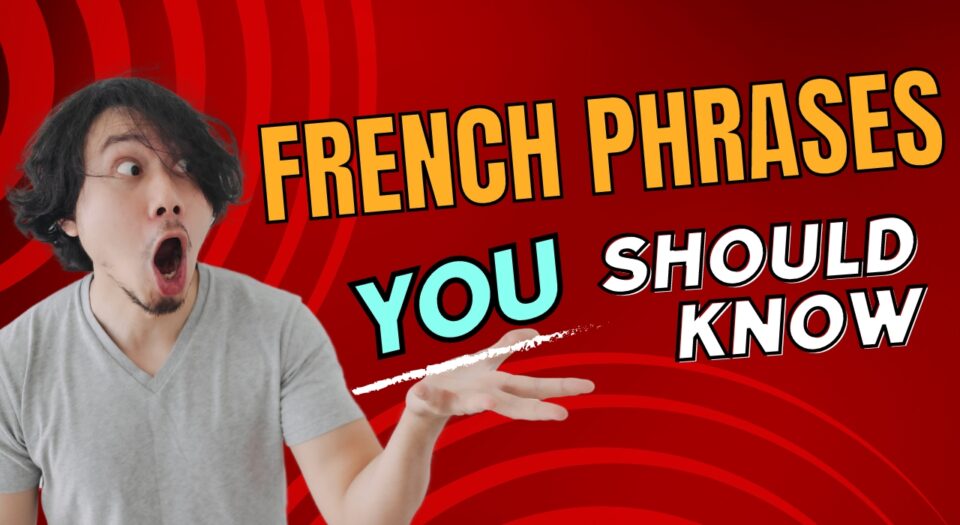Bonjour! Are you looking to impress your friends with your French skills or planning a trip to France? Whether it’s for personal or professional reasons, learning basic French phrases can be extremely helpful. From ordering food at a restaurant to navigating your way around the city, speaking even just a few words of French can open up new opportunities and enhance cultural experiences. In this blog post, we’ll cover some essential phrases for everyday conversations that will help you communicate effectively in French-speaking countries. So grab a croissant and let’s get started!
Table of Contents
Introduction to French Phrases
French is a beautiful language spoken by millions of people around the world. Whether you’re planning a trip to France or just want to be able to communicate with French speakers, learning some basic French phrases is a great place to start.
In this section, we’ll introduce you to some essential French phrases for everyday conversation. We’ll cover greetings, pleasantries, and some other useful phrases that will come in handy in many different situations. After reading this section, you’ll be on your way to sounding like a native speaker in no time!
Basic Greetings and Introductions in French
In any language, greetings and introductions are some of the most basic phrases you need to know. They’re also a great way to start learning a new language. French is no exception.
Here are some basic French greetings and introductions you can use in your everyday conversations:
- Bonjour (Hello)
- Salut (Hi)
- Ça va? (How are you?)
- Je m’appelle… (My name is…)
- Enchanté(e) (Pleased to meet you)
Common Questions and Responses in French
If you’re planning a trip to a French-speaking country, or you just want to be able to communicate with French speakers in your own country, it’s useful to know some common French phrases with pronunciation. In this blog post, we’ll cover some common questions and responses in French that will help you in everyday conversations.
- Comment allez-vous?
This is one of the first things you should learn how to say in French. It means “how are you?” and is a great way to start a conversation. You can also use the abbreviated form, “ça va?”, which is more informal.
- Je vais bien, merci. / Ça va bien, merci.
These are both ways of saying “I’m good, thank you.” The first one is more formal, while the second one is more informal.
- Qu’est-ce que c’est? / C’est quoi? / C’est qui?
These are all ways of asking “what is this/that?” The first two are more formal, while the third one is more informal. You can use them interchangeably depending on the situation.
- Excusez-moi / Pardonnez-moi / S’il vous plaît / Merci beaucoup!
These are all important phrases to know for polite conversation in French.
Everyday Conversation Phrases in French
If you’re hoping to learn some basic French conversation phrases, you’ve come to the right place. In this section, we’ll cover some of the most commonly used French phrases for everyday conversation. From greetings and introductions to expressions of thanks and leave-taking, these essential French phrases will have you chatting away in no time.
Bonjour (hello)
Comment ça va? (How are you?)
Je vais bien, merci. (I’m good, thank you.)
Comment allez-vous? (How are you?)
Ça va? (How’s it going?)
Salut! (Hi!)
Oui? / Non? (Yes? / No?)
S’il vous plaît (please)
Merci beaucoup / Merci bien (Thank you very much / Thank you very much)
De rien / Il n’y a pas de quoi (You’re welcome / Don’t mention it)
Pardon / Excusez-moi (Excuse me)
Je suis désolé(e) (I’m sorry)
How to Ask for Directions in French?
If you find yourself in France and need to ask for directions, never fear! Asking for directions in French is easy, as long as you know a few key phrases.
To start, simply approach someone and say “Excusez-moi, parlez-vous anglais?” This means “Excuse me, do you speak English?” If they do not speak English, you can try asking if they speak another language that you might know.
If they do speak English, great! You can now proceed to ask them for directions. Start by saying something like “Je cherche…” which means “I am looking for…” followed by the name of the place you are trying to find. For example, “Je cherche le musée du Louvre.”
Once you have stated where it is that you are looking for, finish your request by asking them how to get there. A good way to phrase this is “Comment puis-je y aller?” which translates to “How can I get there?”
With these few simple French phrases, asking for directions will be a breeze!
Tips for Learning and Practicing French Phrases
- Try to find anative speaker of French to practice with. This could be a friend, family member, or even a tutor.
- Use various resources to help you learn and practice French phrases. There are many websites, apps, and books that can be used for this purpose.
- Don’t be afraid to make mistakes when speaking French. Everyone makes them, and it’s the only way to truly learn the language.
- Be patient when learning French phrases. It takes time and practice to become proficient in a new language.
Conclusion
Learning French can be a fun and rewarding experience, whether you are just starting out or looking to brush up on your skills. By familiarizing yourself with some of the basic phrases used in everyday conversations, you’ll soon be able to communicate more fluently and confidently. With practice, patience and dedication you will eventually be able to master the language and use it for various purposes such as travel or business meetings. Bonne chance!

